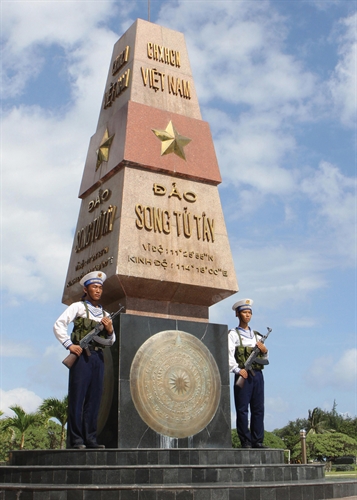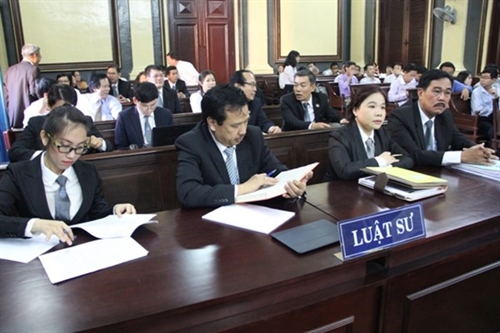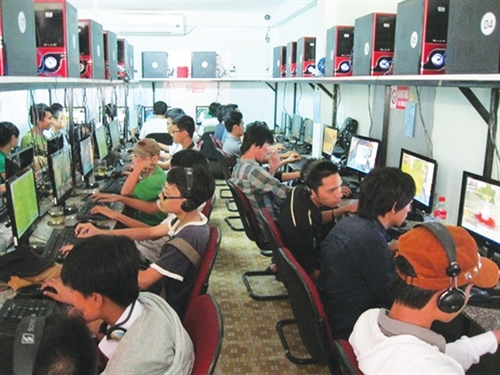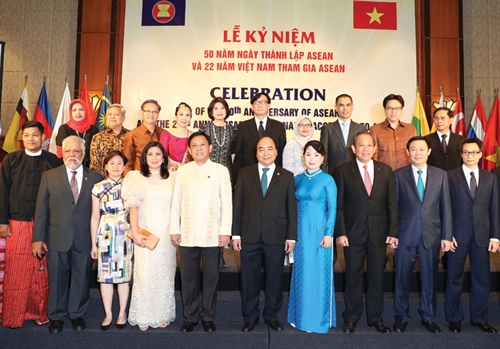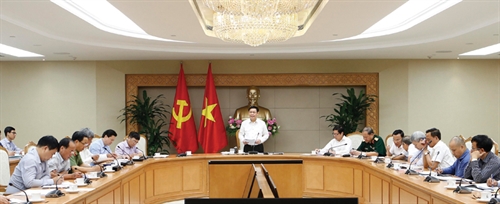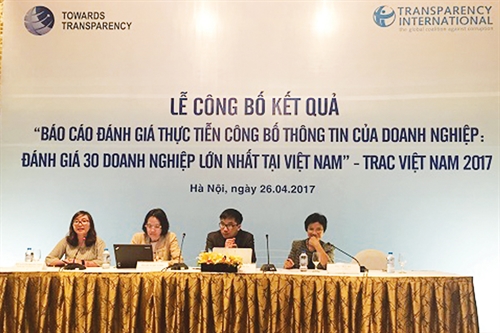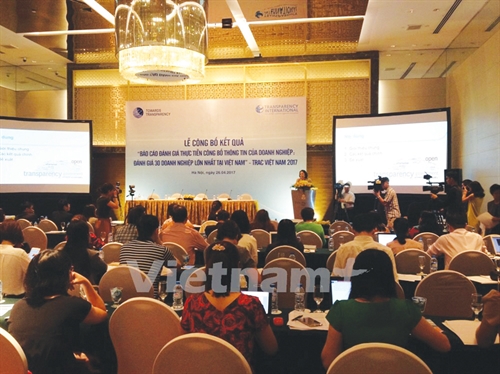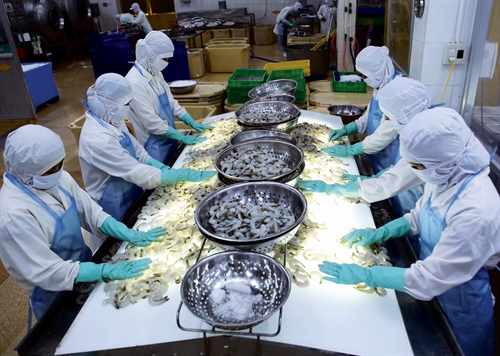The new Anti-Corruption Law aims to create mechanisms to prevent and combat corruption in a proactive and comprehensive manner so that state officials dare not and cannot commit corrupt acts.
Nguyen Tuan Anh
Government Inspectorate
The latest draft of the revised Anti-Corruption Law was tabled to the National Assembly for discussion at its year-end session wrapped up on November 24.
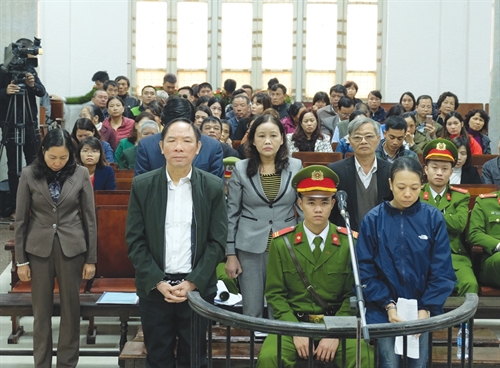 |
| Deputy Director of Hanoi Agriculture and Rural Development Department Phan Minh Nguyet (standing, left, second row) and five accomplices at the court hearing held by Hanoi People’s Court for their embezzlement and position-related crimes on December 6__Photo: Nguyen Cuc/VNA |
It consists of 129 articles arranged in 11 chapters, 11 articles and 1 chapter more than the initial paper unveiled in June 2016.
According to the Government Inspectorate, the agency in charge of drafting the Law, the draft attaches importance to sharpening corruption prevention tools, focusing on increasing publicity, transparency, integrity and accountability, upholding the responsibility of heads of agencies, organizations and units in the performance of public duties and management and use of public assets and finance, and monitoring property and incomes of state officials in a more effective manner.
The draft seeks to improve the detection of corrupt acts through clearly defining the functions, tasks and powers of related state authorities and encouraging public involvement in anti-corruption activities. It also provides for the handling of corrupt acts with administrative, disciplinary and economic measures.
In order to effectively prevent corruption, according to the drafters, it is necessary to improve management mechanisms in different aspects of social life and strengthen the organization of the state apparatus. Hence, the draft Law focuses on solutions which do not exist in the laws concerning the organization of the state apparatus or do exist but prove unsatisfactory in effectively preventing corruption in the past time.
Compared to the current law, the draft Law has many new contents, including combat of corruption in the non-state sector, corruption prevention measures, detection and handling of corruption cases, and responsibility of heads of agencies, organizations and units.
Anti-corruption work in the non-state sector
Prompted from the current requirements for cleaning up the business environment and protecting lawful rights and interests of law-abiding businesses and investors, the draft Law expands the scope of anti-corruption work to the non-state sector.
The draft Law asks non-state businesses and social organizations to develop and implement their own anti-corruption measures in conformity with the laws regulating their organization and operation such as the Law on Enterprises and the Law on Credit Institutions. State authorities will conduct inspection and examination of their anti-corruption work only when obtaining sufficient grounds as prescribed by law.
Specifically, public companies, credit institutions and investment funds are required to ensure publicity and transparency in their organization and operation, control conflicts of interests, enhance integrity and the responsibility of their heads, and promote property and income declaration and monitoring. The reason for the above requirement is that these economic entities operate under a governance mechanism which separates ownership from management, especially in terms of interests, which gives rise to the risk of managers abusing their positions and powers. The cleaning up of these entities will also greatly contribute to protecting legitimate rights and interests of related stakeholders and ensuring sustainable development of the economy.
Social organizations which are required to implement the above anti-corruption measures include those set up under decisions of or have their charters approved by the Prime Minister, Minister of Home Affairs or provincial-level People’s Committee chairpersons and involved in raising lots of funds for charitable activities.
Many National Assembly deputies expressed their backing of the expansion of the scope of anti-corruption work, saying that it was not uncommon for people in the non-state sector to collude with public servants to conduct corrupt acts.
They pointed out that the expansion also made the anti-corruption law align with the Penal Code, which already dealt with such cases.
Some other deputies said, however, it was necessary to clearly identify what “corruption” meant.
They noted that people in the non-state sector were likely to commit bribery, not corruption. Besides, as corruption involved the abuse of public power, causing losses of state money, the act was committed mostly by those in the state sector.
There was even an opinion saying that if charities were regulated by the law, they may be asked to disclose their assets, which could discourage people in doing charity.
Corruption prevention measures
The draft Law introduces four strong measures to prevent corruption as follows:
(i) Increasing publicity and transparency in the organization and operation of agencies, organizations and units
In order to avoid overlap with other specialized laws, the draft Law deals with this issue in a more general manner, focusing on the principles, contents and forms of publicity. It underlines that the responsibility for publicity rests with heads of agencies, organizations and units. Additionally, the draft Law clearly provides the organization of press conferences and appointment of spokespersons, the right to request information and the duty of organizations, units and competent persons to provide information (Articles 12 thru 18 of the draft Law).
Concurrently, considering assessment of the situation of corruption and anti-corruption work an extremely important task which helps improve the effectiveness and efficiency of this work, the draft provides in Articles 19 and 20 the responsibility of state agencies to make and disclose reports on the situation of corruption and anti-corruption work. Specifically, the Government will report to the National Assembly on the situation of corruption and anti-corruption work nationwide; the Supreme People’s Court, Supreme People’s Procuracy and State Audit Office of Vietnam will coordinate with the Government in preparing reports on the situation of corruption and anti-corruption work. People’s Committees at various levels will report to their People’s Councils on the situation of corruption and anti-corruption work in their localities.
(ii) Promoting integrity in the operation of agencies, organizations and units
Integrity is one of important pillars of anti-corruption work. The draft’s provisions on integrity have been developed on the basis of gathering and systematizing relevant provisions in the current Law and other laws dealing with this issue. These provisions include the code of conduct of cadres, civil servants and public employees and their prohibited acts; provisions on giving and receipt of gifts; and the code of professional ethics and code of business ethics (Articles 23 thru 26).
In order to tighten management and supervision of state officials and Party members, the draft Law provides in Article 23 the code of conduct of persons with positions and powers in agencies, organizations and units, aiming to stop the assignment of family members to jointly perform corruption-prone jobs. The draft Law also lists specific acts that must not be done by cadres, public employees and civil servants and by heads and deputy heads of agencies, organizations and units.
Particularly, the draft Law has new provisions (Article 27) on integrity education as a measure to prevent corruption and responsibilities of education administration bodies, the Government Inspectorate and other related ministries and sectors for providing integrity education.
(iii) Controlling conflicts of interest
Conflict of interest refers to a circumstance when a cadre’s, public employee’s or civil servant’s performance of his tasks or exercise of his powers is or will be affected by his personal interests. Recognizing the importance of controlling conflicts of interest as a task to eliminate conditions and circumstances for committing corrupt acts, the draft Law specifies the contents, order and procedures for controlling conflicts of interest, responsibility to report conflicts of interest; and processing of these reports (Articles 28 thru 30).
(iv) Increasing property and income transparency and supervision
The draft Law has a separate chapter with many new, important provisions on supervising property and incomes of state cadres, civil servants, public employees and persons with positions and powers in the non-state sector.
While retaining current regulations on the obligation to declare property and incomes, the draft makes it clearer that a declarant must declare not only his or her own property and incomes but also those of his or her spouse and minor children.
However, as opinions remain divergent on the question who will be obliged to declare property and incomes, the draft law leaves two options open.
The first option asks a wide range of persons to declare their property and incomes, from public employees appointed for the first time, civil servants holding leadership or management posts, to cadres and public employees elected, appointed, re-appointed or assigned to hold positions in state agencies, political organizations, socio-political organizations and other organizations that use state budget funds.
The second option requires property and income declaration only by persons working at central-level agencies or organizations and having a position-based allowance coefficient of at least 0.7 and local officials having a coefficient of at least 0.9. Those who have a coefficient under 0.7 will be required to declare their property and incomes only if they work in corruption-prone areas.
Particularly, the draft Law abolishes the requirement on annual declaration but requires initial declaration and supplementary declaration. It provides that from the date the Law comes into force, initial declaration will be made by all persons who are obliged to make declaration and by persons who are appointed for the first time and by persons expected to be elected, appointed, re-appointed or assigned to act as representatives of state capital at enterprises. Supplementary declaration is required of persons who have made initial declaration and are proposed to be elected, appointed, re-appointed or assigned to act as representatives of state capital at enterprises and persons whose property and incomes increase by VND 50 million or more. In their supplementary declarations, declarants must provide explanations about changes in their property and incomes.
Discussing these two options, some National Assembly deputies were in favor of the second one, saying it was better to focus on people holding important positions in central and local governments.
However, some argued that corruption did not depend on the allowance coefficient but rather the type of job. For example, a low-ranking official in corruption-prone sectors like customs, tax, or local police was more likely to be corrupted than a high-level official in the National Assembly or a People’s Council.
They therefore suggested having different requirements for different sectors and types of jobs, rather than the two options in the draft Law.
Some deputies asked for harsher measures to punish those found dishonest in declaring their assets, besides administrative punishments already imposed.
Detection and handling of corruption cases
The draft Law again provides two options for handling corruption cases detected through inspections or audits.
The first option says that corruption cases which are detected through inspections or audits should be handled under the Law on Inspection and the Law on the State Audit.
As per the second option, upon detecting an act showing signs of corruption, the person having issued the inspection or audit decision must direct the verification and clarification of the nature and degree of such act before making conclusions. If finding any sign of crime, he will transfer the case file to an investigation body and notify the case to the People’s Procuracy of the same level. In case a state inspection agency or audit office lack conditions for verifying, clarifying and making conclusions on a suspicious corruption case, the person having issued the inspection or audit decision will transfer all related documents and objects to a competent investigation body for handling and also inform the case to the People’s Procuracy of the same level.
According to the drafters, the provisions under the second option aim to clarify the responsibility of state inspection and audit agencies to handle corruption cases detected during inspections or audits without changing the current criminal procedure law.
These provisions also seek to uphold the role of state inspection and audit agencies in the detection and handling of corruption cases. Reality shows that in many cases, especially those involving embezzlement or illegal use of public assets and finances, state inspection or audit agencies are completely capable of clarifying and concluding on the nature and severity of corrupt acts but the number of cases transferred by these agencies to investigation bodies for further handling is far below expectations of the State and people. This can be attributed to the lack of clear regulations on the responsibility and role of these agencies.
The second option will also help promote coordination among inspection and audit agencies, investigations bodies and procuracies in detecting and handling corruption cases.
Anti-corruption responsibility of heads of agencies, organizations and units
The draft Law devotes a separate charter to dealing with this issue.
In order to enable the determination of personal responsibilities in anti-corruption work, the draft clearly defines those who are “heads of agencies, organizations or units”. It then specifies their anti-corruption responsibilities to serve as a basis for handling them when they fail to implement or improperly implement their tasks, leading to the occurrence of corrupt acts.
The draft law provides the responsibilities of heads and their deputies for corrupt acts occurring in their agencies, organizations or units and the responsibility to take such measures as suspending from work and temporarily transferring to another working position cadres, civil servants or public servants suspected of committing corrupt acts (Articles 91 and 92).
The draft law also specifies extenuating and aggravating circumstances in determining responsibilities of heads for corrupt acts committed in their agencies, organizations or units. Worthy of note, it makes a new provision that a head who voluntarily resigns before being examined for his responsibility will not face discipline, unless his violation is subject to criminal prosecution. This provision aims to raise the political responsibility of the head, helping form a “culture of resignation” when violations occur in an agency, an organization or a unit.
Punishment of corrupt persons and violators of anti-corruption law
This issue is provided in a new chapter which is added to the draft Law to ensure no-mercy punishment of corrupt persons and violators of anti-corruption law. In light of this, the draft Law stresses that any person committing corrupt acts must be handled in accordance with law, even if he has retired or changed to another job. A head or deputy head committing corrupt acts will face harsher penalties.
The draft law, however, sets forth principles for handling those who commit corrupt acts but voluntarily confess and cooperate with competent authorities before their violations are uncovered and voluntarily hand over corruption-related property and money. Besides, it provides for the handling of bribe givers and takers and violators of anti-corruption law (Articles 112 thru 127).
The draft Law also contains a separate chapter on the anti-corruption role and responsibility of the society, including the Vietnam Fatherland Front and its member organizations, the press, citizens, people’s inspection boards and investment supervision boards of the communities (Articles 97 thru 100).
Regarding international cooperation in anti-corruption work, the draft incorporates provisions on international cooperation in the recovery of corruption-related property with a view to raising the effectiveness of this work while ensuring conformity with the United Nations Convention against Corruption. The draft law assigns the Supreme People’s Procuracy to act as the national focal point in foreign cooperation to recover corruption-related property. It will be responsible for receiving and processing corruption-related property recovery requests filed by foreign and Vietnamese entities (Article 111).-
